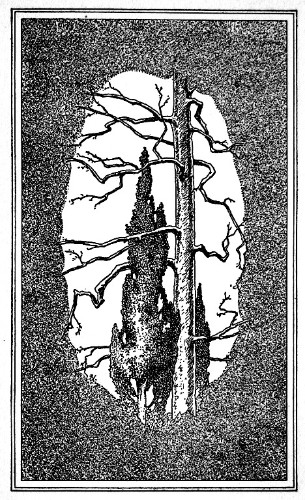
CHAPTER III
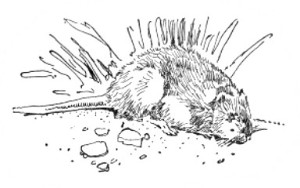
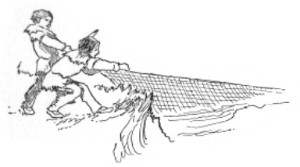
BUT if that was the Day of
Wonder the one that followed was certainly the Day of Despair. It
started out
well enough. Jimmy was aroused early in the morning, when the dawn's
chill was
still in the air, so that for a few moments he was very
miserable, but the hot
tea and food, combined with a good fire, soon put him in spirits. He
and
Taw-kwo visited the steel traps and took from them three fine muskrats.
Then
they unfastened one end of the net and hauled it in. This was most
exciting.
First appeared a gleam of something white under the water; then the
gleam
slowly defined itself. A breathless moment followed. How big was the
fish? What
kind was it? And then with a flop it was on the bank, beating the
ground to the
whoops of two enthusiastic boys. Taw-kwo had even produced a short
heavy bow
and some blunt-headed arrows, when a summons called them to
resume the
journey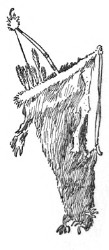 . .
About ten o'clock a few
drops of rain fell. Jimmy thought, of course, the band would seek
shelter. It
did not. The rain grew heavier, picking the surface of the river. Water
ran
down Jimmy's hair, speedily wetting him to the skin. He shivered and
looked
about with uneasiness on the landscape, rapidly growing
sodden. The Indians
seemed to mind the downpour no more than did the dogs. But Jimmy
suddenly felt
very lonely. The romance of the Magic Forest had quite departed, and he
began
to think of his warm home and his mother and father, and to wonder
whether
he
would ever see them again.
After a
little he began to cry softly to himself, the tears mingling with the
raindrops
running down his cheeks. But he was very still about it, for Taw-kwo
was in a
canoe near him, and little May-may-gwan was paddling solemnly in the
bow of
another just behind. The raindrops were coursing down her cheeks, too.
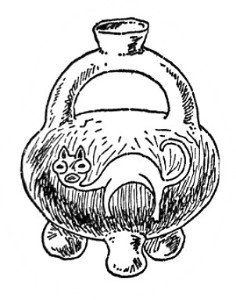
All that day Jimmy's heart
grew heavier and heavier. He paddled desperately in order to keep warm
and so
toward night grew tired also. It was a very blue day. In the evening he
stood
by the fire with the Indians and steamed. To his surprise the
night was not so
bad. The roofs of the shelters had been so slanted that the heat was
reflected
from them down upon the ground, which speedily dried. It was a little
damp, but
not all uncomfortable.
And next morning the sun was
shining brightly with true spring warmth. Thus Jimmy passed with credit
through
his trial by water. Rain and cold weather were always
disagreeable to him, but
in time he learned that one forgot all about it once it was finished.
Only twice that day was the
regular progress down river interrupted by anything exciting.
Long stretches
of still water were broken by swift little rapids, where Jimmy had to
sit very
still, and carries through the woods, where he had to work with the
others. He
was interested all the time. The most trivial incident was an
adventure. But a
little after noon, in shooting a particularly crooked and turbulent
rapid, in
spite of the best efforts of Makwa and Ah-kik, the canoe scraped
sharply
against a pointed stone. Instantly the water began to rush in
through a jagged
hole. By good fortune this was at the foot of the rapid. The Indians
paddled
desperately across the pool and grounded just in time. The goods were
hastily
thrown out and the canoe drawn up on the beach.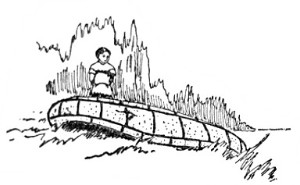
Jimmy looked sadly at the
rent in the bottom of the canoe. It was too bad. He supposed that now
the day's
journey would have to be given up.
But Makwa disappeared in the
woods while Ah-kik built a little fire. The other Indians continued on
down-stream. In a moment Makwa returned with a quantity of spruce pitch
on a
bit of bark. This he cooked over the fire with a little grease. Then
with a
stick of wood he smeared the melted gum about the hole, laid over it
smoothly a
bit of sacking, smeared more gum completely to cover the whole affair,
and
seared it close with a brand from the fire. In ten minutes the canoe
was as
good as ever.
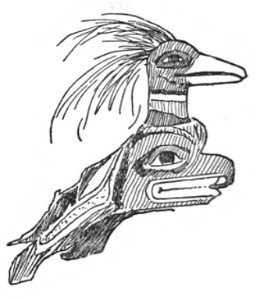
About an hour later Makwa
whispered "Moos-wa, moos-wa." Jimmy had learned by now that when
Makwa whispered, something interesting was afoot,
so he looked
with all his
eyes. There, not two hundred yards away, knee deep in the water, stood
a cow
moose and her calf. The great animals, so awkward in
captivity but so
magnificent in their proper surroundings, stared uncertainly
at the gliding
canoes. The
wind was the wrong way for
the scent, and
a moose is not easily
alarmed by mere sight. In a moment they waded rapidly ashore and
disappeared
with a long swinging trot, but not before Jimmy had seen well the Roman
nose,
the big eyes, the massive shoulders of the animals. As moose to him had
always
seemed as remote as goblins, this new phase of the Magic Forest filled
him with
ecstatic rapture. And he was impressed still further by the lesson of
woods
moderation, for his companions had made no effort to kill the beautiful
creatures. For the present there was meat enough. something interesting was afoot,
so he looked
with all his
eyes. There, not two hundred yards away, knee deep in the water, stood
a cow
moose and her calf. The great animals, so awkward in
captivity but so
magnificent in their proper surroundings, stared uncertainly
at the gliding
canoes. The
wind was the wrong way for
the scent, and
a moose is not easily
alarmed by mere sight. In a moment they waded rapidly ashore and
disappeared
with a long swinging trot, but not before Jimmy had seen well the Roman
nose,
the big eyes, the massive shoulders of the animals. As moose to him had
always
seemed as remote as goblins, this new phase of the Magic Forest filled
him with
ecstatic rapture. And he was impressed still further by the lesson of
woods
moderation, for his companions had made no effort to kill the beautiful
creatures. For the present there was meat enough.
That evening after supper
Jimmy made friends. He was not so sleepy as the first evening
nor so
uncomfortable as the second, so he wandered here and
there trying his
new Indian
words. Especially did the cradles for the Indian babies interest him.
Everywhere he was smiled upon by the kindly people. Some even made him
little
presents of ornaments. Taw-kwo's father gave him a sheath-knife on a
belt. He
became acquainted with the other children and joined in their games,
sitting gravely cross-legged in a
circle, taking his turn at the knuckle bones with the rest.
Even in the three
days he had acquired a fair vocabulary, and
he understood
vaguely much more than he could
remember.
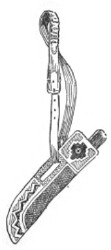
The next morning a lad of
sixteen led him hunting in the woods.
Jimmy was awkward but tried
hard, and after a number of futile stalks
the two succeeded in getting within sight of one of the drumming
partridges.
The bird was strutting up and down a smooth log, puffed out like a
turkey-cock,
and beating his wings rapidly to produce the hollow wooden drumming
Jimmy had
been hearing for three days. The Indian lad drew the blunt head of his
arrow to
the bow. Rap!
it struck a tree just beyond the partridge's head. The
bird flew away.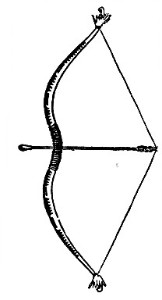
But now for the first time
Jimmy felt the joy of the chase. Here was something to work for. He
borrowed
the bow and the blunt arrows, and at every pause rap-rap-rapped
the
trees with his practice shots. By dint of imitation he succeeded after
a little
in acquiring a fair accuracy, though of course he could not beat his
Indian
friends. Then he set to work to stalk a partridge. Dozens and dozens he
frightened away by a clumsy approach. Four times his arrow went wide.
But then
at last the bird, alarmed by the twang of the bow, raised its head
directly
into the flying arrow. Jimmy cast his weapon from him, and fell upon
the game
with shrieks of delight.
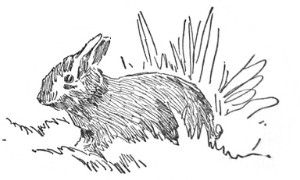
Asádi, the older
lad, taught
him how to spread a horse-hair loop across a rabbit trail, bending down
a
sapling in such a manner that it would spring straight when disturbed,
thus
jerking the rabbit into the air. At the foot of some of the waterfalls
great
fishing was to be had with the hook and line. A morsel of
meat, a
bright-colored feather, even a metal button so attached as to whirl was
bait
enough. There was no waiting. The instant the hook touched the water a
dozen
swirling fish were after it. Through the long evenings the big fellows
could be
seen jumping, shooting straight out into the air to fall back with a
heavy
splash. Once Jimmy hooked one of these, and had not Asádi
been at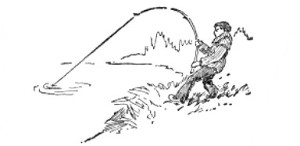 hand to help
him, he would have been pulled overboard. And when at last they
succeeded in
sliding the monster on to a flat rock, how beautiful he was with his
iridescent
eyes and the bright spots of his body. hand to help
him, he would have been pulled overboard. And when at last they
succeeded in
sliding the monster on to a flat rock, how beautiful he was with his
iridescent
eyes and the bright spots of his body.
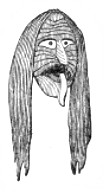
Not the least interesting of
the many wood's puzzles were the numerous footprints to be
seen on the wet
sand of the beach. Asádi or Taw-kwo or even little Oginik,
who was much younger
than any of them, could tell him their names, but only long experience
taught
him what the animals might be like. "Makwa" they described broad
heavy prints. "Me-én-gan" said they when shown others
smaller and
rounder and not so flat. "Bisíw," they replied when he asked
about
certain padlike signs. But he did not know from that.
However, one day as the
canoes were paddling down a long narrow lake, Ah-kik called his
attention to
something white a long distance down the shore. The speck of white was
moving
slowly toward them. In a little while it defined itself as an animal.
Everybody
sat quite still. The beast was not in a hurry. Sometimes it trotted,
sometimes
it walked, sometimes it stopped to investigate something on the shore.
In the
canoes the dogs' backs were all bristling. Soon Jimmy could see that
the animal
was not white but gray, and that it looked a great deal like the Indian
dogs
except that it was larger and that it sloped from heavy shoulders to
lighter
haunches. When just opposite the waiting line of canoes, the
Indians raised a
mighty yell. Startled, the animal scuddled along the beach like the
wind. Point
after point it passed, still running, until at last, again as
a white speck,
it bobbed out of sight. The Indians laughed consumedly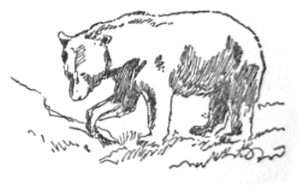 . .
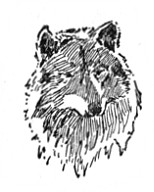
"Me-én-gan,"
explained Ah-kik.
But Jimmy knew also the
English name now, for he had often watched the wolves in Bronx Park
cages.
Makwa he learned in a
manner
still more exciting. He and Taw-kwo came on a little open space in the
woods
one morning. The grass was almost knee high. Suddenly out of it, not
ten feet
away, a great black bear rose to his hind legs and said woof! Now if a
human being
in a civilized room says woof to you suddenly,
you are startled; but when
it is a big animal in a wild place, you beat all records on
the back jump. At
least, that is what Jimmy did, and he started to run away, but Taw-kwo
jumped
up and down and waved his arms frantically and shouted, until the bear,
who was
a peaceful beast, dropped to his four feet and ambled away. "Makwa,"
said Taw-kwo, when he had got his breath.
But the third was the most
exciting of all. That particular afternoon the Indians had gone into
camp
early, and now the whole band, with the exception of Jimmy and the very
youngest children, were off in the woods. Jimmy was trying to make
himself an
arrow, and was absorbed in the work. Suddenly he heard a strange
squeaking
noise near at hand, and looked up to discover two large gray kittens
tumbling
about not three feet away. And then, compelled by some strange
hypnotic
influence, his glance raised until it rested with a start of alarm on
the pine
shadow at the edge of the woods. A pair of fierce yellow eyes looked
into his
own. Little by little, he made
out a lithe form, pad-like paws, wide whiskers, tasselled
ears. And all at
once he realized that the beast was angry.
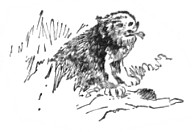
At that moment one of the
smaller children discovered the kittens, and
immediately toddled forward to
investigate such new playmates. A low, rumbling growl broke from the
shadow.
Like a streak of light the animal sprang. The mere weight of its body
knocked
the child from its feet. All the others cried out. The beast
hesitated, one
paw on the pappoose's chest, undecided what to do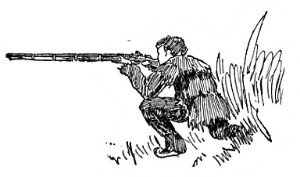 . .
Jimmy was frightened, but he
remembered seeing Makwa's gun standing against a log behind
him. At his first
movement the animal growled again and opened and shut its claws
restlessly.
Jimmy moved as cautiously as he could. The little Indian lay quite
still.
Finally, the long trade gun was in the white boy's hands. He had to
rest the
but on the ground and use both hands to cock it, and even then it was
so heavy
that he could just lift it to his eyes. The first movement of the
muzzle caused
the beast to utter a perfect thunder-storm of snarls. Jimmy knew that
he had
but a moment. He pointed the wavering barrel as well as he
could, and pulled
the trigger. That was all he knew about it. His next sensation was of
water in
the face, followed by an increasing ache in the region of his shoulder.
The
trade gun, unskilfully held, had kicked him about ten feet.
But there was the baby,
sound and well; and there was the animal, minus half its head; and
there were
the kittens, unfortunately killed by the returning dogs; and
there was Jimmy
with a brand new bit of information, -- that bisíw,1
with the broad,
padlike prints, was a huge cat.
And
so the days went by. Sometimes they floated all
day; sometimes they struggled through woods; sometimes they toiled
painfully
through swamps. They endured rain, wind, cold. Always the spring
advanced and
the freshet waters receded. Young ducks began to be seen. The trees of
the
forest grew smaller.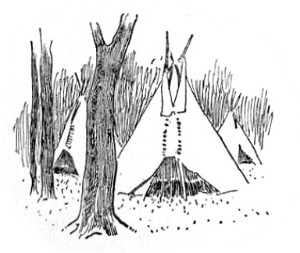
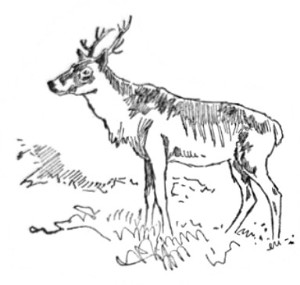
Caribou took the place of
deer. Jimmy could talk with his friends now, and, by dint of much
listening
could understand most of what was said.
At last, after coursing for
many miles down a broad swift stream without rapids, they came to where
another
river joined theirs, and on the point formed by the junction
they went ashore
and established a permanent camp. First the women pitched the
conical teepees
with the many poles. Then they built fire-holes and hung
kettles. Then they
cut quantities of balsam for the floors and to scatter on the
thresholds. And
finally they began the construction of a long rectangular lodge of
poles and
branches and decorated skins.
In the meantime the men were
all off hunting, and the boys were conducting an industrious fishery.
The
spoils were sliced thin, and jerked, or smoked. Then they were laid on
scaffolds out of reach of the dogs. In a week the camp was bountifully
supplied.
And finally the packs were
undone and all the gorgeous beaded and ornamented finery brought out,
brushed
and aired, after which the entire band settled into what seemed to
Jimmy to be
an anxious waiting. He asked them about it, and they replied, but the
words
were of those he had not learned. He only knew that around the lower
bend a
sentinel always stood. And one morning early that sentinel fired a
shot.
Instantly the camp swarmed into view. The men, seizing their guns, ran
eagerly
to the point. Jimmy followed in breathless excitement.
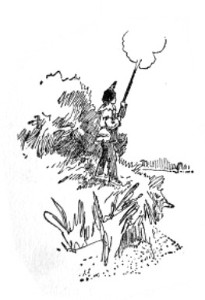
__________________
 Click the
book image to turn
to the next Chapter.
Click the
book image to turn
to the next Chapter. |

